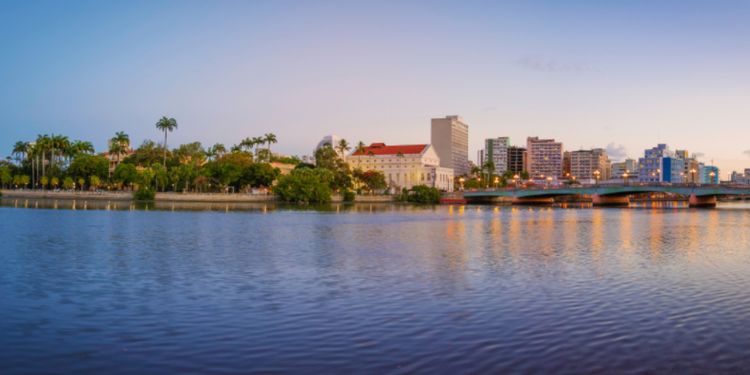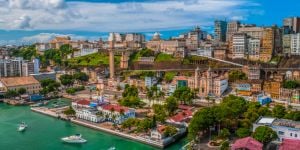
Recife, located on the northeast coast of Brazil, on the tip jutting out into the South Atlantic, is one of Brazil's oldest cities. But today, it's a major trade and trans-shipping hub in the region. Recife offers many accommodation options, and for a city its size, housing is inexpensive, despite an influx of foreigners over the last several years. Before beginning your search for accommodation in Recife, have a look at Expat.com's Accommodation in Brazil section.
Living in Recife
Recife is one of the oldest cities in Brazil, having been founded in 1537. This area was for years contested by the Dutch, and there are still examples of Dutch architecture to be found in the city. Recife is sometimes referred to as the Brazilian Venice because of its many bridges and canals connecting the different neighborhoods. Recife attracts thousands of visitors and expatriates from around the world each year.
Although Recife has a tropical climate, warm to hot all year round, it benefits from steady onshore breezes, which moderate the heat somewhat.
As Recife is geographically nearer to Europe than any other city in South America, it has become a major trans-shipment hub. It also receives many passenger flights from Europe and also some from North America.
Neighborhoods in Recife
Recife doesn't have a good reputation where safety is concerned. Carefully choose the area where you plan to stay and exercise care when going out after dark. That said, there are several nicer areas in different parts of the city.
In Zona Sul (South Zone), consider Pina and Boa Viagem, especially the southern part near Jaboatão. These bairros (city districts) lie along the beach. In Zona Norte (North Zone), there are several smaller bairros that are nice places, including Graças (around Jaqueira square especially), Casa Forte, Espinheiro, Derby, Aflitos, and Boa Vista. In the western part of the city, which is more suburban, consider Torre, Madalena, and Ilha do Retiro. Apipucos is also affluent, but is located in the northwestern sector far from the beaches and downtown, though on a lake.
You'll find a mix of types of residential buildings in Recife. Along the beaches, you'll encounter principally high-rise apartment buildings, which could be good choices for expats. They offer amenities and security.
As for the beaches, some of the better ones include Coroa do Aviao and Boa Viagem. Porto de Galinhas, a couple of hours south of the city, is consistently rated one of Brazil's top beaches. These are all nice areas to stay for vacations or short-term visits.
Attention:
Although sharks are extremely rare along Brazil's coast, they're frequently encountered off of Recife, so exercise care when engaging in watersports here.
If you want to learn more about some of the better neighborhoods in Recife, then read on. We'll explore them in detail below.
Historic Center
If you want to be in the middle of everything interesting, then living in the Historic Center can be amazing. Here, you'll see lots of churches and chapels, as well as the market and the old summer houses that used to belong to the Brazilian nobility. In addition, the oldest synagogue in America is located in the Historic Center.
Because it's the city center, you'll find great transport connections here. If you do business often, then this can be a convenient place to live. However, because it's in such a centrally-located area, expect rent prices to be expensive.
Boa Vista
If you want to be close to the Historic Center, but you want cheaper rent prices, try Boa Vista. It's very convenient for expats, as the embassy headquarters in Recife are located in this neighborhood.
You'll hear Boa Vista described as the “bohemian” area of Recife, so if you find that interesting, then you might find a second home here. There are numerous bars where there are often poetry readings. You'll be in the midst of all the action here too, as the Carnival of Recife is held in Boa Vista every year.
If you've got family and friends who want to visit you in Recife, then Boa Vista places you close to everything interesting. Plus, it has plenty of hotels, hostels, and other types of accommodations that'll suit every preference.
Casa Forte
Case Forte is located west of the city center. It's not too far away from the American consulate, as it's located in downtown Recife and is 15 minutes away by car.
The neighborhood of Casa Forte is much more affordable than in the actual city center. So it'll be worth it to rent here and go into the city center when you want, just to save some money.
Graças
Graças is also located west of the city center of Recife. It's one of the most socially-integrated neighborhoods in the city, so it's great for expats.
You'll find plenty of things to do in Graças, as this neighborhood has lots of bars, restaurants, art galleries, and museums. It's also very family-friendly, so it's great if you're bringing yours over to Recife.
Here, you'll find more affordable rent prices than in the actual city center. So enjoy being close without paying the price for it. It'll be worth it, as it's considered an upscale neighborhood in Recife.
Espinheiro
The Espinheiro neighborhood is yet another one that's just west of the city center. In fact, it's right next to it, so you're not far away from the vibrant area.
Like the other two neighborhoods, rent prices are affordable compared to the actual city center.
Piedade
Piedade is one of the richest neighborhoods in Recife. It's very close to the beach and has lots of modern and luxurious villas to rent. Another rich neighborhood (Boa Viagem) is also close by, so if you ever tire of living in Piedade, you can always give Boa Viagem a try.
When you choose Piedade as your place of residence, you'll feel like you're always on vacation. With its gorgeous beaches and plenty of shopping options, you'll be living in paradise.
Boa Viagem
Boa Viagem is also one of the richest neighborhoods in Recife. As you might've guessed, it's like Piedade in that it's in close proximity to the beaches and there are amazing and modern villas for rent. It's south of the city center and is in the greater metropolitan area of Recife. If you want to live where all the young and trendy people are, then Boa Viagem is right for you.
Boa Viagem has 7 kilometers of sandy beaches, which is what Recife's most famous for. You can find natural pools that are warm enough to swim in, and in the waters, you'll see beautiful reefs.
The people who live here are active, as Boa Viagem offers the perfect setting for things like beach volleyball, jogging, tennis, and cycling. You'll also find many hotels, restaurants, and shops, and there's great nightlife here too.
If you can afford it, Boa Viagem is perhaps the best place to live in Recife. This is especially true if you enjoy a good nightlife, as Boa Viagem comes highly recommended for that.
Accommodation prices
Boa Viagem is a desirable area, and accordingly, prices here are high by local standards. Still, rent prices range a good bit, and you can find three-bedroom units in high-rise apartment buildings for between R$2,000 and R$3,500 (Brazilian reals), including the condominium fees and taxes. One-bedroom units can be found for R$1,000, including condo fees, but expect to pay twice that for a nicer place in a good building.
In Madalena, in the West Zone, there are many one-bedroom apartments available for R$1,300 to R$1,500 (condo fees and taxes included). In Graças, in the North Zone, prices are very similar. In Casa Forte, a very popular neighborhood also in the North Zone, prices are a little higher, at R$1,500 to R$1,700 for a one-bedroom apartment (condo fees and taxes included).
Prices to buy are also moderate. To buy an apartment in one of the better areas, expect to pay from R$7,000 to R$8,000 per square meter. But prices can drop to R$4,000 per square meter in other areas.
Good to know:
Despite onshore breezes, Recife is often hot! Be sure that your home has air conditioning.
The rental process
Take your time getting to know the different neighborhoods in Recife. If possible, take a stroll through each one to get firsthand experience as to how it feels for you. And you never know if there are “for rent” signs in front of ideal properties.
If you'd like to view a property, you'll contact either the landlord or the rental agency. You'll schedule a time for both of you to go out and see the property together. Make sure to try the light switches, sinks, etc. to make sure everything is working as expected before you sign anything.
Accommodations can be tough to find in Recife, especially in the nicer neighborhoods. If you find the property to your liking after viewing it, it's best to let the landlord or rental agency know that you'd like to take it. Otherwise, they might end up giving it away to someone else.
Signing the lease
You should know that in normal circumstances, Brazilian rental contracts span 30 months or anywhere between two to three years. In most other countries, rental contracts span just 12 months, so this might understandably make you wary.
Fortunately, you just might be able to negotiate a shorter contract, especially if the neighborhood you're looking at has lots of other expats or the property's owned by a rich Brazilian who'd like to use their home for a short period of time during the year. You might be able to get a 12-month lease, or something even shorter if you'd like. In this case, you'll still sign a 30-month rental contract. However, the landlord or real estate agent will add a clause. It'll say that you can get out of the contract anytime after 12 months and not face any consequences.
When you want to sign a Brazilian lease, the landlord will usually require you to have a fiador or co-signer. Your fiador will need to meet certain requirements to fill that position for you, and sometimes, you might be asked for two fiadors. For most expats, finding even one will be impossible since they're new to the country. If this sounds like your situation, then you can just pay a higher deposit instead of finding fiadors. You might also be able to show your landlord a strong work history to show that they can count on you having a steady source of income that'll enable you to pay rent on time.
Also, you can try to haggle for a lower rent price. It'll be easier with a private landlord, as you'll be dealing with just one person and not a company. However, this doesn't mean it's impossible to negotiate for a lower price with a rental agency. It'll be more difficult, but you never know if you'll be successful, so give it a try.
Lastly, you'll need your Cadastro de Pessoas Fisicas (CPF) or Brazilian Identity Card to sign the lease. It'll take a few months to get it after you arrive in Brazil, so you'll have to stay in short-term accommodation until you get your CPF. So keep this in mind when you want to sign for a property.
When everything's ready, you'll sign the Contrato de Locação de Imóvel, which is the rental contract. You and the landlord both need to sign it, and it'll be in Portuguese. So if you're not fluent, you'll want to consult with a friend or colleague who is. If that's not possible, you can also hire a professional translator to go over the contract with you.
Keep in mind that if you're signing this contract while you're overseas, you'll have to have it notarized. Because foreign notarizations aren't accepted, you'll have to get it notarized in Brazil too.
The deposit
Generally, you'll need to pay between one to three months' rent for the deposit. The landlord or rental agency will have to keep this money in a separate savings account not linked to their personal account. And if they earn any interest during your stay, you'll get that amount, no matter how much of your deposit they return to you.
For short-term accommodations, deposits aren't required. You'll just pay rent month to month.
Expats signing a contract from outside of the country might be required to pay a 50% down payment. Legally, landlords can ask for this or that you have a fiador sign with you.
Useful links:
We do our best to provide accurate and up to date information. However, if you have noticed any inaccuracies in this article, please let us know in the comments section below.








